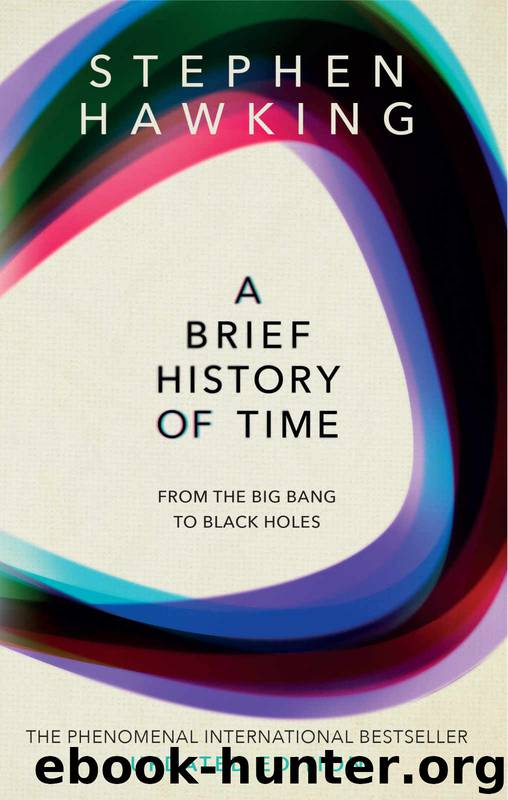A Brief History of Time: From Big Bang to Black Holes by Stephen Hawking

Author:Stephen Hawking [Hawking, Stephen]
Language: eng
Format: epub
Tags: Science, Cosmology, Physics, General
ISBN: 9781409092360
Google: 9ysba1A1UF8C
Publisher: Transworld
Published: 2009-11-10T12:25:14.845484+00:00
Of course, if a black hole as close as Pluto were to reach the end of its life and blow up it would be easy to detect the final burst of emission. But if the black hole has been emitting for the last ten or twenty thousand million years, the chance of it reaching the end of its life within the next few years, rather than several million years in the past or future, is really rather small! So in order to have a reasonable chance of seeing an explosion before your research grant ran out, you would have to find a way to detect any explosions within a distance of about one light-year. In fact bursts of gamma rays from space have been detected by satellites originally constructed to look for violations of the Test Ban Treaty. These seem to occur about sixteen times a month and to be roughly uniformly distributed in direction across the sky. This indicates that they come from outside the Solar System since otherwise we would expect them to be concentrated toward the plane of the orbits of the planets. The uniform distribution also indicates that the sources are either fairly near to us in our galaxy or right outside it at cosmological distances because otherwise, again, they would be concentrated toward the plane of the galaxy. In the latter case, the energy required to account for the bursts would be far too high to have been produced by tiny black holes, but if the sources were close in galactic terms, it might be possible that they were exploding black holes. I would very much like this to be the case but I have to recognize that there are other possible explanations for the gamma ray bursts, such as colliding neutron stars. New observations in the next few years, particularly by gravitational wave detectors like LIGO, should enable us to discover the origin of the gamma ray bursts.
Even if the search for primordial black holes proves negative, as it seems it may, it will still give us important information about the very early stages of the universe. If the early universe had been chaotic or irregular, or if the pressure of matter had been low, one would have expected it to produce many more primordial black holes than the limit already set by our observations of the gamma ray background. Only if the early universe was very smooth and uniform, with a high pressure, can one explain the absence of observable numbers of primordial black holes.
The idea of radiation from black holes was the first example of a prediction that depended in an essential way on both the great theories of this century, general relativity and quantum mechanics. It aroused a lot of opposition initially because it upset the existing viewpoint: ‘How can a black hole emit anything?’ When I first announced the results of my calculations at a conference at the Rutherford-Appleton Laboratory near Oxford, I was greeted with general incredulity. At the end of my talk the chairman of the session, John G.
Download
This site does not store any files on its server. We only index and link to content provided by other sites. Please contact the content providers to delete copyright contents if any and email us, we'll remove relevant links or contents immediately.
Tools of Titans by Timothy Ferriss(8347)
Turbulence by E. J. Noyes(8003)
Secrets of Antigravity Propulsion: Tesla, UFOs, and Classified Aerospace Technology by Ph.D. Paul A. Laviolette(5358)
Astrophysics for People in a Hurry by Neil DeGrasse Tyson(5169)
Room 212 by Kate Stewart(5091)
Design of Trajectory Optimization Approach for Space Maneuver Vehicle Skip Entry Problems by Runqi Chai & Al Savvaris & Antonios Tsourdos & Senchun Chai(5055)
Pale Blue Dot by Carl Sagan(4984)
The David Icke Guide to the Global Conspiracy (and how to end it) by David Icke(4685)
A Journey Through Divination and Astronomy by Publishing Pottermore(4370)
Goodbye Paradise(3790)
Apollo 8 by Jeffrey Kluger(3690)
COSMOS by Carl Sagan(3604)
The Five People You Meet in Heaven by Mitch Albom(3545)
Losing the Nobel Prize by Brian Keating(3527)
How to Read Water: Clues and Patterns from Puddles to the Sea (Natural Navigation) by Tristan Gooley(3448)
Brief Answers to the Big Questions by Stephen Hawking(3411)
How to Read Nature by Tristan Gooley(3315)
The Order of Time by Carlo Rovelli(3174)
A Brief History of Time by Stephen Hawking(3009)
